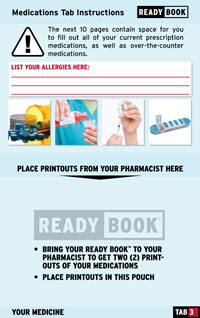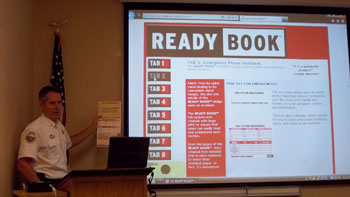It was a pretty small turnout for the ReadyBook Class on Thursday, November 17th…which frankly is a shame. This very informative presentation, given by Fire Chief Devin Hull, had life-saving and critical information for our community.
Did you know that Oregon State Statute REQUIRES emergency personnel to resuscitate unless a POLST Form is supplied? The POLST Form (Physician Orders for Life-Sustaining Treatment) is required to be signed and dated by a physician…these forms can even be stored online now, so emergency crew can look them up while in transit to you. More information at www.ohsu.edu/polst. If the form is in your READYBOOK, that helps in an emergency also.
Think about it: you’re unconscious, and obviously cannot explain to parademics your health situation: your prescriptions, any issues, such as pace-maker, diabetes, even your identity. That’s where this nifty READYBOOK comes in. It has spots for your photo (and your pets), your identification, your prescriptions and any documentation which would assist paramedics.
This book is also critical in an emergency. If you are needing to evacuate, it contains barcoded wrist-bands, so you can be easily located by family and friends, a list of items to take with you, and other important safety information. Chief Hull explained that the City of Jacksonville is working with the Cavalry and Presbyterian Churches to use as evacuation spots. The Elementary school might be needed by the school district potentially. Chief Hull is on the State Emergency Management Team, and told the class that everytime he attends conferences and meetings across the country, Mayors and city personnel always say they wished they had been better prepared. Being prepared as individuals and in our community is something we can control.
It is common for people to be “Isolated and Placed” in an emergency also. This means, staying in our homes instead of being placed elsewhere. In this case, other items are needed for survival like water, pets food, flashlights, propane for the barbecue, candles, blankets, and more. The READYBOOK has an entire section with a list of these items, and even bright signs which read “OK” or “HELP” for the front door of our homes.
Let’s not stick our heads in the sand Jacksonville! Let’s be prepared – attend these classes, and learn how to help ourselves and others in an emergency situation. As Fire Chief Hull explained, “Jacksonville is a very small town. We are low on the food chain for fire personnel and other responders, who will be directed to the larger towns first. We need to expect the unexpected and be well prepared to fend for ourselves for a while.”
It could be an explosion from a gas tanker blocking ingress and egress from town, a log truck on fire in town (which happened recently by the way), an earthquake, a forest or home fire, etc. Emergencies can be “small” and still effect us.
The Jacksonville Fire Department and CERT Team are available to give you a FREE READYBOOK and go over how to complete it, etc. CERT Volunteer, Linda Kestner, attended the class and is willing to help any individual who wants to fill out a Ready Book, take their photo, prepare a “To Go” kit and a shelter-in-place kit, etc. There is a lot of support for this – and people like Linda who are willing to take the time to assist you. Comment on this article if you need more information, and The Review, will pass along your name, email and phone if if you provide it!
Chief Hull will be giving monthly presentations (after skipping December). January’s will be “Map Your Neighborhood,” so please stay tuned and willing to participate – it can only make us a better-prepared town and community!
The READY BOOK contains 8 easy to use Tabs or Sections:
 Tab 1: Introduction and Instruction pages.
Tab 1: Introduction and Instruction pages.
Tab 2: Instructions and Photo pages are used to fill in the names of residents, service animals and pets. Hull says, “Emergency responders don’t always know what a resident looks like, so having a photo handy is really useful for i.d. purposes.”
Tab 3: Emergency Phone Numbers includes contact information for caregivers, family, friends, doctors, pharmacists, insurance companies, veterinarians, attorneys and other key figures in your life. A handy 10 page section provides ample room to list all prescription medications and dosage amounts as well as a clear plastic sleeve pocket to store copies of all your prescriptions. “In an emergency situation, especially with injuries involved, we really need to know the victims’ medical needs. Accessible information is key to helping us help you,” Hull says.
Tab 4: Your Important Papers provides another plastic sleeve to store important medical papers. Hull notes, “This would be a great place to store copies of your living will, donor card and other important medical-related information.”
Tab 5: Emergency Supply Instructions provides a check list to prepare a “Go-Kit.” In case of evacuation, Hull says, “your Go-Kit is critical – we will suggest using a gym bag or backpack filled with vital supplies such as an extra change of clothes, spare eyeglasses, hearing aid batteries, dentures, oxygen, personal care items and a host of other recommended supplies.” Class attendees will learn how to pack a Go-Kit that is customized to each family member. “And don’t forget Go-Kits for your pets,” Hull says.
Tab 6: The Emergency Supply Instructions provides a check list to prepare a “Stay-Kit,” used to hunker down for days during an emergency. Hull notes, “The class will cover what items are most needed to survive for 72 hours – from water, food, blankets, tools, to first aid supplies and more.”
Tab 7: I.D. Band Instruction section provides 5 arm bands used to identify household members. “In case of evacuation, you need to be wearing a waterproof wrist band that can be scanned and used to identify you, your family members and your pets in case you get separated from each other,” Hull says.
Tab 8: contains a “Notes” section to be used for information not contained elsewhere in the Ready Book.
Each book also contains a “Help” and “Okay” window placard to alert passing emergency response teams as to your condition. “In the event of a major natural disaster, placing the bright red HELP sign in your living room window could make the difference in receiving emergency help or not. While cruising your neighborhood, if we can see you need help more easily, chances are dramatically increased that we will get to you much sooner. And, if you are okay, we are able to then attend to others in your area who need help knowing your household is safe,” Chief Hulls says.
For more information, please contact the Jacksonville Fire Department at 541-899-7246.


I attended this informative presentation with essential information. What could be more important than personal health and safety? I would love to see neighbors and the greater community taking the simple steps needed to prepare for an emergency event. An ounce of prevention is worth a pound of cure.